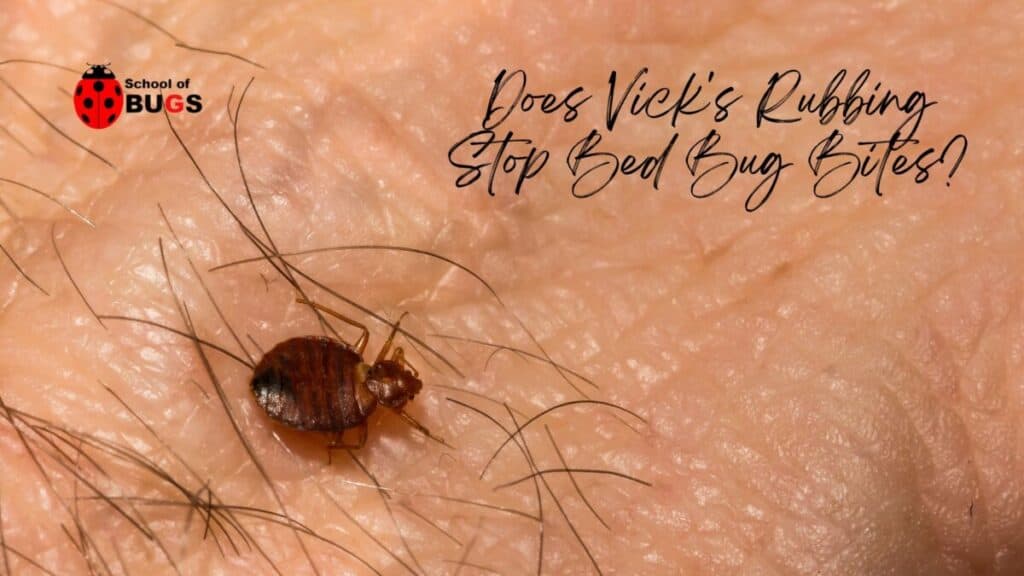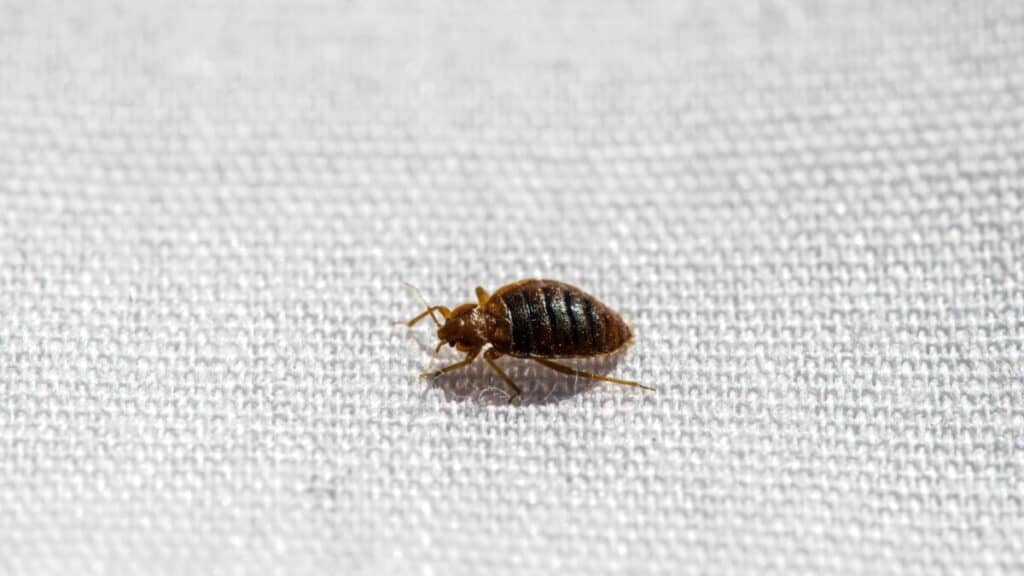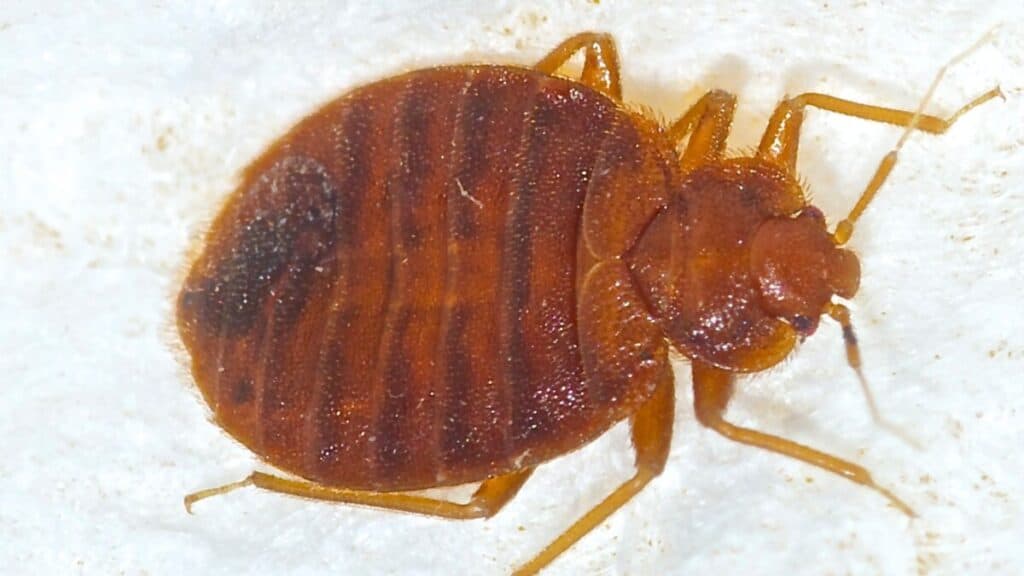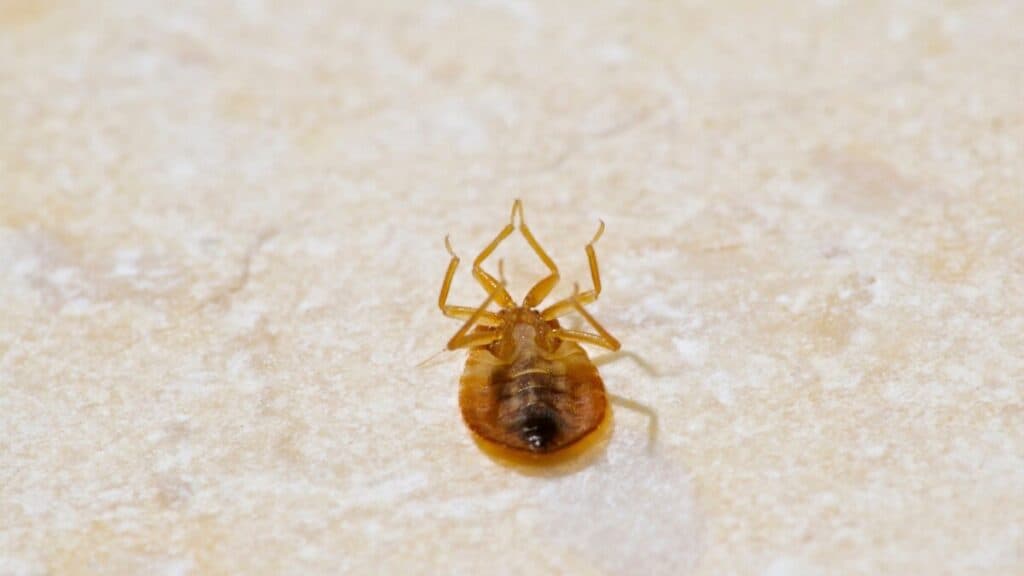
If you wake up in the morning with itchy, red spots all over you, or one of your kids does, the first thing you need to do is check for bed bugs.
Bed bugs are rapid-infestation insects. One day they aren’t there and the next, they’re all over your bed. One thing bed bugs don’t like, is strong, minty odors.
Vick’s Vapor rub matches that description and is potent enough to drive bed bugs away. However, Vick’s is more of a preventative, keeping bed bugs away rather than destroying them or affecting their eggs, both of which need to be done.
- How Vick’s Vapor Rub affects Bed Bugs
- Does Vick’s Vapor Rub kill bed bugs?
- Treating your bed with Vick’s: Reasonable or not?
- Vick’s Vapor Rub’s potential for toxicity
- Vick’s relation with essential oils
- Ingredients in Vick’s Vapor Rub
- Types of Vick’s Vapor Rub
How Does Vick’s Vapor Rub Affect Bed Bugs?
Vick’s Vapor Rub preceded the essential oils industry by a long shot. It contains several essential oils on its own, including eucalyptus oil, turpentine oil, and cedar leaf oil. It also contains nutmeg, menthol, and thymol.

You can apply Vick’s to your skin and it will effectively prevent bed bugs from chowing down on your delicious blood throughout the night. What it doesn’t do is kill them. It just makes them avoid you like the plague.
It’s just a temporary solution. Bed bugs are naturally averse to some of the potent odors and chemicals in Vick’s Vapor Rub, specifically, the camphor smell culled front eh eucalyptus oil, menthol, and thymol.
Bed bugs may dislike some of the other ingredients in Vick’s Vapor Rub as well but it’s hard to narrow them down without applying them individually. Fortunately, it doesn’t matter much because Vick’s will keep them off of you for the time being.
However, unless you expect to douse yourself in Vick’s every night for the rest of your natural life, you’re going to have to do something about eliminating them at their source. That means going after their eggs and the bed bugs themselves.

Does Vick’s Vapor Rub Kill Bed Bugs?
Unfortunately, Vick’s Vapor Rub won’t kill bed bugs. It’s only effective as a temporary deterrent. They dislike the minty, strong medicinal odor of Vick’s Vapor Rub but it is far from lethal to bed bugs.
Bed bugs are incredibly resilient—almost as resilient as their flea buddies. They burrow deep into the crevices, cracks, and corners of the bed frame and, if they have enough room, down into the mattress as well.
It might surprise people to know that most bed bugs aren’t even on their mattresses. The mattress is essentially the highway for bed bugs to travel across.

You can apply Vick’s Vapor Rub to the cracks and corners of the bed frame and that will deter them for a time, just not forever.
The biggest drawback of Vick’s Vapor Rub, aside from the fact that it’s not lethal to bed bugs, is it doesn’t last long as a deterrent either.
You might get a solid 24 hours out of the stuff if you apply it pretty liberally or leave big goops of it everywhere.
Is it a Good Idea to Treat Your Bed with Vick’s Vapor Rub?
There is a such thing as too much of a good thing. Treating your bed with Vick’s Vapor Rub would probably end up irritating you more than it would deter the bed bugs.
You don’t want to apply Vick’s to your mattress and it’s not the best idea in the world for bed frame applications either.

The reason is that it doesn’t last very long and it doesn’t address the underlying issue by actively killing bed bugs.
There are much better ways to both prevent and kill bed bugs. Better in terms of effectiveness but they require a good deal of effort as well.
Vick’s Vapor Rub, when used to prevent bed bugs, should only be something you use for a single night, just to get you through the problem until you can come up with a more permanent solution in the morning.
Toxicity of Vick’s Vapor Rub
Believe it or not, Vick’s Vapor Rub does have a degree of toxicity that should be concerning. If you use it on yourself to ward off bed bugs for the night, you should only use tiny amounts sporadically over your body.
Normally, Vick’s is applied on the chest before you go to sleep. It’s supposed to ease the airflow through your passageways by reducing congestion, both in the chest and in the sinuses.
There is a clear warning on a Vick’s Vapor Rub label that it should never be applied directly under or on the nose.
Of course, it goes without saying that you should never ingest the stuff or put it anywhere near your mouth or eyes.
The three ingredients in Vick’s Vapor Rub that are the most harmful are camphor, eucalyptus oil, and menthol.

Even though you’re supposed to be able to use Vick’s to rub into sore muscle areas, some people are subject to a variety of negative reactions to it.
- Hives rise on the skin where Vick’s is applied
- Difficulty breathing
- Facial and lip swelling
- Swelling in the throat, constricting your ability to breathe
- Severe congestion
- Swelling of the tongue
This doesn’t apply to everyone and it doesn’t even apply to most people. However, everyone who uses Vick’s Vapor Rub should never apply it extensively, all over the body. This is part of the reason why you shouldn’t use Vick’s Vapor Rub to ward off bed bugs.

The problem is that bed bugs are more than happy to bite you all over and you can’t apply Vick’s Vapor Rub all over the body.
Types of Vick’s Vapor Rub
In terms of combatting bed bugs, there is really only one type of Vick’s Vapor Rub, which is the original paste that everyone is used to and understands. Vick’s also has a lotion that you can use, however, it’s very toned down from the original version.
Vick’s also sells vapor patches but, like the lotion variation, it’s nowhere near as potent and it would be difficult to use patches to lay down enough of the Vick’s to ward off bed bugs. With that being said, the original Vick’s Vapor Rub does come in a few scents.
Bed bugs, like most insects, don’t like the smell of lavender, and Vick’s Vapor Rub Lavender is the same as the original, with the addition of the lavender scent. They also manufacture a lemon scent, and a ‘no mess’ VapoStick.

The problem with all of these is that the original already repels bed bugs. None of the various creams, lotions, or scented original formulas are going to drive bed bugs off more than the original.
Alternatives to Vick’s Vapor Rub
There are several alternatives to Vick’s that will effectively repel bed bugs. However, also like Vick’s, they don’t actively kill bed bugs, at least not so far as killing them all the way to the source.
- Rubbing alcohol
- Essential oils
- Coconut oils
- White vinegar
- DEET
Deet is the common ingredient found in bug sprays and it’s part of what gives bug sprays their strange scent.
Since you can apply bug spray directly to your skin, you can also apply it to your bed and the surrounding framework.
Unfortunately, the stuff stinks even worse indoors than it does when you spray it on outside, around the BBQ.
Essential Oils
Essential oils are an effective preventative as well. In fact, as we mentioned above, Vick’s contains a few essential oils on its own.
Eucalyptus is the primary essential oil that bed bugs hate the most but they also strongly dislike peppermint essential oils and lavender essential oils. Even orange essential oils work, just not quite as effectively.

It helps to use a diffuser with essential oils, which may drive some of the bed bugs away with the strong smell of the oil in the air.
Outside of a diffuser, it’s hard to effectively apply essential oils to the bed mattress. The only way to do a semi-decent job is to dilute essential oils in water and spray it on the bed mattress.
The problem with the spraying method is that oil doesn’t mix well with water, so you won’t get a good spread across the mattress.
You can spread essential oils, without diluting them, in the cracks and crevices of your bed frame, which is where most bed bugs hide, for a better result.
White Vinegar
White vinegar is more effective when diluted in water and sprayed all over the bed. Once again, it won’t kill the bed bugs. What it will do is act as a more effective deterrent than Vick’s Vapor Rub.
You can spray it on your bed mattress, dilute it and take a bath in white vinegar, and you can spray your bed frame.
How to Kill Bed Bugs

While Vick’s Vapor Rub is a good idea for prevention, that’s all it will ever be. Killing a bed bug infestation is a pretty involved process.
You don’t want to just focus on the bed frame, the mattress, or the surrounding areas on an individual basis.
- Seal all of the cracks and crevices in the room where the infestation is happening
- Any items that can be removed (and are infested), remove immediately
- Purchase heavy-duty, large plastic bags (garbage bags) for dealing with pillows
- Purchase a plastic mattress sealer
- Remove all the sheets, pillowcases, rugs, and comforters from the room
- Wash all of those items in hot water
- Seal your pillows and mattress in plastic
- Leave a tiny opening when you seal the mattress and pillow
- Insert a vacuum hose into that tiny opening
- Turn on the vacuum and suck the air out of the plastic-covered pillows and mattress until they are fully compressed
- Seal it immediately after withdrawing the vacuum hose
The one thing that kills bed bugs for sure, no questions asked, is sucking the oxygen out of their environment.
Heat works as well but you can’t throw your mattress in the washer and dryer. All you need to do now is use a chemical desiccant to kill bed bugs on the bed frame and furniture.
All Things Considered
While Vick’s Vapor Rub is a very effective deterrent, it will only keep the bed bugs off you. What it won’t do is kill them and eliminate their ability to lay eggs, breed, and grow.
If you are dealing with an infestation, Vick’s Vapor Rub should be nothing more than a small stepping stone in the direction of dealing with the infestation once and for all.
Alright, that’s it for this article, here are a few hand-selected articles that you might also find interesting reads:
9 Things You Should Know About Bed BugsDoes Lysol Kill Bed Bugs?
Does Roach Spray Kill Bedbugs? The Quick Answer
Recent Posts
Tiny Black Bugs in Bathroom NO WINGS: What They Are and What to Do!
Finding tiny black bugs in your bathroom can be uncomfortable, to say the least. Especially if they are persistent, or they appear in very large numbers, which they often like to do. When it...
Tiny Black Bugs in Plant Soil - What Are They & What To Do About It
A short horror story: You get a new houseplant. You do your best to take care of it. You’ve ensured that it has the right soil, the right amount of sun, it gets enough water. And then one day, you...

